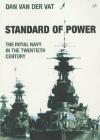Standard of Power
The Royal Navy in the Twentieth Century
Van der Vat, Dan
2001, Pimlico, London
ISBN 0712665358
Paperback, 480 pages, 34 photos, charts
| Type. | Operational & Social History |
| Pros. | Solid, effective, revealing single-volume operational and social account of the RN from 1900-2000. Effective narrative style, often evocative description, anecdotes and humour. Very clear maps, many effective photos, good coverage of life in the Navy. |
| Cons. | Cannot avoid briefly discussing some key events and processes. |
| Rating. |  |
 Dan van der Vat’s latest work continues the thorough and insightful stance of his earlier naval history works. This book has the same clarity, balance and coverage of his Stealth at Sea: the Submarine, of 1994 and Atlantic Campaign of 1988. It also manages to compress into 800 pages the enormous change and scale of events the RN underwent from 1900 to 2000. The number of types, roles and ships, the changing strategic and technical environments, the numbers, status, conditions and pay-rates of the seamen and officers are discussed at regular intervals, providing a ready and effective frame in which to place the RN and its tasks at every stage.
Dan van der Vat’s latest work continues the thorough and insightful stance of his earlier naval history works. This book has the same clarity, balance and coverage of his Stealth at Sea: the Submarine, of 1994 and Atlantic Campaign of 1988. It also manages to compress into 800 pages the enormous change and scale of events the RN underwent from 1900 to 2000. The number of types, roles and ships, the changing strategic and technical environments, the numbers, status, conditions and pay-rates of the seamen and officers are discussed at regular intervals, providing a ready and effective frame in which to place the RN and its tasks at every stage.
Most importantly, the book commences with what van der Vat wisely describes as “their finest hour”: the key convoys of March to May 1943, when the RN, or at least Western Approaches Command, contributed their “Battle of Britain” to the global Allied struggle, saving the nation and the Allied war effort as surely as the few RAF fighter pilots had three years before. Van der Vat’s book is the first major work to place the key months of the Atlantic campaign in this position, not second to the naval war as a whole, nor beneath Dunkirk or the Blitz, but beside them, in context, as they should be. The Atlantic Campaign really was vital, and May 1943 the crux of the European war. It is high time this was realised outside the narrow world of those who know and understand Atlantic ASW. Here it gains at last a wider readership.
Van der Vat, while keeping to a conventional chronological narrative structure, nevertheless manages to rise above the purely what and when of the events of the century. At every stage, from Boxer Rebellion and Ententes with the French, through technological advance and the rising threat of German seapower, the history and customs, errors and stifling traditions of the RN are discussed and related to the times and the incidents they shaped. The Great War is shown as a blend of tradition and innovation overcoming dire threats to the nation and the navy, as the massed fleets of dreadnoughts counted for little in the era of mine and U-Boat. Cryptology and muddling through, as well as the size of the navy and its Allies, kept them from defeat. No stupidity or failure escapes van der Vat, as he examines all the errors and omissions which prevented better ASW earlier. Yet it is the last-minute use of convoy which saved the situation, and enabled the entry of US forces which proved the decisive factor in 1917-18, as they would again a generation later.
Van der Vat then passes on to discuss the problems of funding and peace-mongering which set up the RN for its second round of strategic and technical failures in the century. The Arms Reduction conferences, the lack of money, and the compromises made all set up the Navy for the shortfalls of the Second World War, yet were in fact not unreasonable for their times. There was little else to be done, either in the bankrupt 1920s or the wholly bereft years of Depression. Even if there had been, the growth of the next German Navy, itself focussed on a balanced conventional fleet, would only have created the wrong sort of navy for 1939.
The Navy found itself ill-prepared for war again, yet the campaigns grew slowly and all sides made mistakes. From the distance of sixty years van der Vat has a solid perspective on the muddling and the mistakes, from Norway to the Indian Ocean, from shining examples of RN seamanship like Plate and the evacuations of 1940 - and the men, great and small involved - the last conventional battles (Bismarck, Barents and North Cape), and the host of small new ones: those in convoy. Here too are shown the pitfalls and advantages of the personalities of the leaders in combat and at conference, and the vital meetings the RN won and lost amid the grand strategising of the middle period of the war. After this are shown the enormous expansion into ASW and amphibious delivery the RN underwent, as well as that of the related RCN. The latter is now shown to be the victim of its own leaders both naval and political. It did a very good job with what its government and the RN gave it. The triumph and troubles of protecting and then putting ashore the eventually victorious Allied armies are discussed, along with the manifest errors and unnecessary strains of the Pacific fleet. This was a fleet without a point, foisted by political ambition upon an unwilling American host. The drawdowns and reductions of the ensuing peace round out this period.
From here to the end of the century the story of the RN is one of continuing cutback, diminution, and adaptation. Amidst these cutbacks are bright moments like the ships trapped up river by the Communist Chinese, such as the able and effective delivery of airstrikes and troops in Korea and the Suez in 1956, with all their attendant political and social hazards. Van Der Vat does not softpedal the emotional and ethical problems of such uses of the navy: they can be seen to be nefarious and ill-advised, for all that they worked from an operational post of view. Here too are the ongoing rounds of technical change: nuclear power, missiles, the Europeanisation of strategy and the NATO focus. This latter came to its zenith right at the moment when the Falklands demanded a very different and more traditional role from the RN, one it was almost too late to be capable of providing. The Soviet threat to the North Atlantic theatre and Treaty continued after the traditional muddle, mistake and trial of the autumn and winter of 1982. Even after the end of the Cold War, the role of the RN as the final and essential defender of the nation, via new and even more effective Trident-equipped nuclear submarines, remained apparent.
Throughout this period the cutbacks in ships, personnel, weapons and roles continued. It was modified by the Falklands War, and in ways very beneficial for the capacity and morale of the RN. It had been sorely tested by the anti-historical and mendacious proposals of the Thatcher government, so much so another 18 months would have seen the RN incapable of fighting the war it went to in April 1982. The RN emerged bloodied, chastened and reshaped, as usual, from the experience. It kept the ASW experience and ability, as well as for amphibious attack and support. Thankfully it was for a war that never eventuated. Instead the RN went to the unstable and infamous “Gulf”, once again, for a campaign it had never prepared for. Here however the RN skills at mine-hunting, and ability to be self-sufficient (learned at great cost in the Pacific in 1944-45 and again in the South Atlantic in 1982) came to the fore. Here they provided vital capabilities to a USN which had always concentrated on other things.
The ongoing role as assistant world policeman and representative of British commitment to European and world peace, or at least partial stability, complete van der Vat’s account, along with a summation of changes and achievements, mistakes, and lessons over the last century. He emphasises above all the RN ability to keep adapting, and the commitment to seakeeping and professionalism as its most valuable assets. The RN is now smaller and more diverse than ever, with fewer bases, personnel and roles than at any time since 1600, but in a dramatically different world compared to any period in its history. It has always been the unexpected and the unlikely which have challenged the RN, and to which it has risen to compete and succeed. Van der Vat’s ability to keep the issues, rather than the events, central to the compressed narrative, is the reason his summation works so well.
The reviewer welcomes your comments on this review.
Review written by Ian Campbell, Launceston, Tasmania.
Published on 2 Feb 2002.
Purchase information: (info) Get Standard of Power now at amazon.co.uk
Get Standard of Power now at amazon.co.uk
Return to our main review page.



